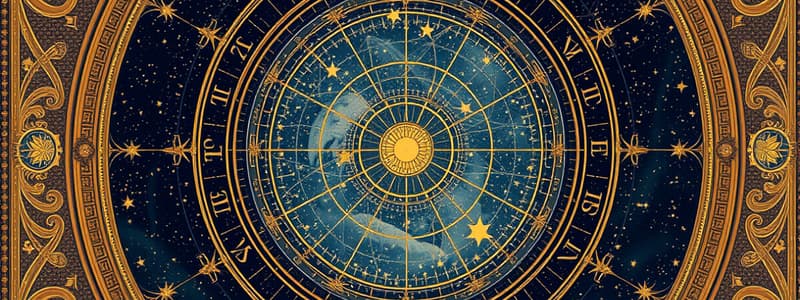Podcast
Questions and Answers
What significant contribution did Ibn Al-Haytham make in his work?
What significant contribution did Ibn Al-Haytham make in his work?
- Development of atomism
- Compilation of Archimedes' works
- Theory of relativity
- Experiments with the camera obscura (correct)
Who compiled an important collection of Archimedes' works in the sixth century?
Who compiled an important collection of Archimedes' works in the sixth century?
- Thales
- Ibn Al-Haytham
- John Philoponus
- Isidore of Miletus (correct)
What was one consequence of the fall of the Western Roman Empire?
What was one consequence of the fall of the Western Roman Empire?
- Increase in philosophical debates
- Advancement of science in the West
- Rise of the Byzantine Empire
- Decline in intellectual pursuits in the West (correct)
Flashcards are hidden until you start studying
Study Notes
Origins of Astronomy
- Western astronomy has roots in Mesopotamia, with late Babylonian astronomy influencing all Western scientific endeavors.
- Egyptian astronomers documented constellations and celestial body movements through monuments.
- Greek contributions included celestial references in Homer's works and naming constellations still used today.
Natural Philosophy
- Originated in Archaic Greece (650 BCE - 480 BCE) with pre-Socratic philosophers like Thales advocating for natural causes over supernatural explanations.
- Emphasized reason and observation, leading to successful experimental hypotheses, such as atomism proposed by Leucippus and Democritus, validated 2000 years later.
Medieval European and Islamic Developments
- The fall of the Western Roman Empire in the 5th century led to decreased intellectual activity in Western Europe; the Byzantine Empire continued advancements in physics.
- Isidore of Miletus compiled works of Archimedes in the 6th century, paving the way for future studies.
- Ibn al-Haytham (c. 965–c. 1040) conducted camera obscura experiments, significantly impacting optics.
- John Philoponus challenged Aristotle's physics in the 6th century, emphasizing observation over verbal argument, introducing the theory of impetus.
- Philoponus' critiques of Aristotelian physics later influenced Galileo during the Scientific Revolution.
- In the 1300s, Jean Buridan expanded the concept of impetus, aiding the understanding of inertia and momentum in physics.
Influence of Islamic Scholarship
- Islamic scholars inherited Aristotelian principles and enhanced them during the Islamic Golden Age by emphasizing observation and reasoning.
- Aristotle's foundational work remained influential in education and science, underpinning much of modern scientific teaching.
Philosophy of Physics
- Physics evolved from ancient Greek philosophy, where early theorists like Thales and Democritus sought to understand matter and motion.
- Known as natural philosophy until the late 18th century, it later differentiated from philosophy and other sciences.
- The scientific method, incorporating a priori and a posteriori reasoning, became critical in advancing physical knowledge.
Core Theories in Physics
- Physics encompasses various systems, with foundational theories applied across disciplines, impacting areas such as engineering and technology.
- Laws of physics, such as Newton's law of universal gravitation, verbally or mathematically express fundamental principles of theories.
- The study of Earth's origin involves modeling its mass, temperature, and rotation, allowing predictions of past and future events.
Research Methodology
- The scientific method is employed by physicists to test theories through experiments and observations in a repeatable and unbiased manner.
- Theoretical physics focuses on creating models that are consistent with experimental data, while experimental physics tests these predictions.
Emerging Discoveries
- The Big Bang theory is supported by successful experiments confirming nucleosynthesis and cosmic microwave background radiation.
- The ΛCDM model incorporates cosmic inflation, dark energy, and dark matter, with ongoing research expected to uncover new discoveries related to dark matter.
Notable Research Tools
- The Fermi Gamma-ray Space Telescope is anticipated to provide transformative data influencing current understanding of the universe.
- IBEX has made discoveries regarding energetic neutral atoms (ENA) within the solar environment, challenging existing models of the heliosphere.
Studying That Suits You
Use AI to generate personalized quizzes and flashcards to suit your learning preferences.




